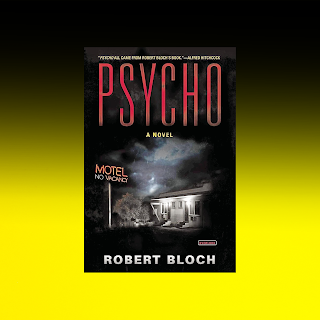Book Review: Psycho by Robert Bloch
This post features affiliate links, which means that we’ll earn
a small commission if you make a purchase through these links.
“I think perhaps all of us go a little crazy at times.”
📚
Psycho is a phenomenal 1959 horror classic that unfolds via dual storylines: that of 40-year-old Norman Bates and 27-year-old Mary Crane. It opens on a rainy, stormy evening with Norman as he reads in his home parlor, reveling in a “grotesque, but effective” nonfiction tome. A plump, glasses-wearing man with thinning hair, Norman — manager of the Bates Motel located just down the hill — immediately reveals himself as someone strange and frightening. Through odd, gruesome, and disturbing thoughts amplified by a tense conversation with his verbally and emotionally abusive mother, Norma, Norman also reveals his simmering rage and frustration toward her, their abusive and dysfunctional relationship, his isolated existence, and the present state of the motel, which has lost business due to the highway’s relocation. While his age clearly designates him as a man, both his mother and the state of his life have reduced him to nothing more than “A big, fat, overgrown Mamma’s Boy.”
Enter Mary, whose tale of woe immediately tugs on the reader’s heartstrings. Intending to drive the full 800 miles to Fairvale to see her fiancé, Sam Loomis, Mary reveals that her fraught family, relationship, and work histories have driven her to steal forty thousand dollars from her employer. She has committed this crime with the goal of paying off Sam’s debts, hastening their elusive nuptials, and finally starting her new life. Exhausted, anxious, and riddled with guilt, regret, and fear after her brash actions — which include leaving her sister and apartment mate Lila in the lurch — Mary makes a wrong turn and becomes lost. Eager for sleep and a hot shower, she pulls into the Bates Motel for the night. Her final thoughts before meeting Norman are that “. . . she’d made her grave now and now she must lie in it. Why did she think that? It wasn’t grave, it was bed.”
After settling into her clean though musty room, Mary, having accepted Norman’s invitation to dinner earlier, heads up to the house. Shocked to see the decaying, outdated abode up close, Mary proceeds into a tense, disturbing, and frightening interaction in which Norman overshares a sanitized version of his personal history, including his unsettling fascination with taxidermy, after which Mary’s comments cause Norman’s behavior to escalate from odd to outright frightening. After returning to her room, Mary considers returning the money, as “. . . she felt a curious sense of . . . predestination. As if everything that had happened was somehow fated to be. Her turning off on the wrong road, coming here, meeting that pathetic man, listening to his outburst, hearing that final sentence which brought her to her senses.” After a week passes with no word from Mary, Lila teams up with Sam — along with licensed investigator Milton Arbogast, hired by Mary’s employer — in an attempt to find her.
Finally reading Psycho was an absolutely chilling and awe-inspiring experience. I’ve seen the movie several times and rewatched it after finishing the book, and I was amazed at how much more psychological the book is and how much of the movie I’d forgotten. From the first page, the reader is immediately granted access to Norman’s demented thoughts, deranged feelings, and twisted rationalizations, which creates an experience far more in-depth, frightening, graphic, scathing, and devastating than in the movie. Mary, too, is a flawed, frustrated, and struggling character; the reader roots for her, sympathizes with her, and understands her — unlike Norman, with whom the reader can certainly sympathize to a certain degree, but never really understand. True horror results from Norman’s actions, which reveal his sad, delusional reality and ultimately relegate him to the prison of his mind and past: “He saw the sky darken as the sun surrendered its splendor. The sun surrendered its splendor — why, it was like poetry; he was a poet; Norman smiled. He was many things. If they only knew—”
This book also contains some fantastic gothic elements, particularly the Bates house, an outdated, moldering relic — “Hideous. Like something out of the last century.” — with the exception of the matriarch’s room: “Downstairs were remnants of the past ravaged by decay, and upstairs all was shabbiness and neglect. But this room was composed, consistent, coherent; a vital, functioning entity complete unto itself.” I went into the book already knowing the full plot, yet the book was still a hair-raising, dread-inspiring, magnetic, and unputdownable reading experience that I devoured in a single sitting. I can only imagine how incredible it would have been had I not known what would happen, and I can absolutely see why this is considered a classic that all horror fans should read at least once!
❤Amanda
Disclaimer
Many books featured on this blog were purchased by us; however, we do accept publisher-, author-, and other source-provided copies (both advanced reader copies (ARCs) and finished copies) from publishers, authors, and other sources we deem to be a good fit for our reading preferences and blog. Posts and reviews that feature such copies are disclosed. For more information, refer to the Disclaimer & Disclosures section.
Some of the links in this post may be affiliate links, which means that when you click one of those links and make a purchase, we earn a small commission paid by the retailers, at no additional cost to you. These links will take you to books and other products that we like, trust, and believe will be beneficial to our readers. Affiliate programs use cookies to track visits in order to assign sale-related commissions; funds earned keep the Site up and running and allow us to continue to share reviews and other content. Thank you for your support!



Comments
Post a Comment